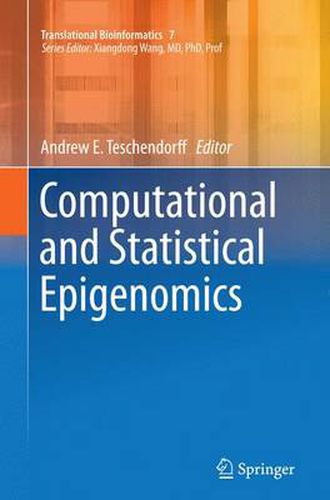Readings Newsletter
Become a Readings Member to make your shopping experience even easier.
Sign in or sign up for free!
You’re not far away from qualifying for FREE standard shipping within Australia
You’ve qualified for FREE standard shipping within Australia
The cart is loading…






This book introduces the reader to modern computational and statistical tools for translational epigenomics research. Over the last decade, epigenomics has emerged as a key area of molecular biology, epidemiology and genome medicine. Epigenomics not only offers us a deeper understanding of fundamental cellular biology, but also provides us with the basis for an improved understanding and management of complex diseases. From novel biomarkers for risk prediction, early detection, diagnosis and prognosis of common diseases, to novel therapeutic strategies, epigenomics is set to play a key role in the personalized medicine of the future. In this book we introduce the reader to some of the most important computational and statistical methods for analyzing epigenomic data, with a special focus on DNA methylation. Topics include normalization, correction for cellular heterogeneity, batch effects, clustering, supervised analysis and integrative methods for systems epigenomics. This book will be of interest to students and researchers in bioinformatics, biostatistics, biologists and clinicians alike.
Dr. Andrew E. Teschendorff is Head of the Computational Systems Genomics Lab at the CAS-MPG Partner Institute for Computational Biology, Shanghai, China, as well as an Honorary Research Fellow at the UCL Cancer Institute, University College London, UK.
$9.00 standard shipping within Australia
FREE standard shipping within Australia for orders over $100.00
Express & International shipping calculated at checkout
This book introduces the reader to modern computational and statistical tools for translational epigenomics research. Over the last decade, epigenomics has emerged as a key area of molecular biology, epidemiology and genome medicine. Epigenomics not only offers us a deeper understanding of fundamental cellular biology, but also provides us with the basis for an improved understanding and management of complex diseases. From novel biomarkers for risk prediction, early detection, diagnosis and prognosis of common diseases, to novel therapeutic strategies, epigenomics is set to play a key role in the personalized medicine of the future. In this book we introduce the reader to some of the most important computational and statistical methods for analyzing epigenomic data, with a special focus on DNA methylation. Topics include normalization, correction for cellular heterogeneity, batch effects, clustering, supervised analysis and integrative methods for systems epigenomics. This book will be of interest to students and researchers in bioinformatics, biostatistics, biologists and clinicians alike.
Dr. Andrew E. Teschendorff is Head of the Computational Systems Genomics Lab at the CAS-MPG Partner Institute for Computational Biology, Shanghai, China, as well as an Honorary Research Fellow at the UCL Cancer Institute, University College London, UK.